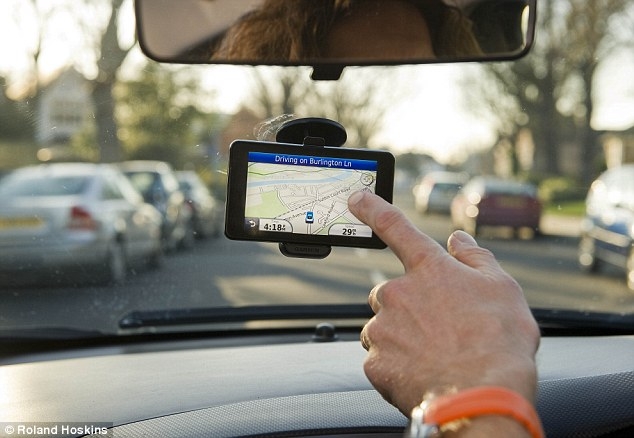
(Source: DailyMail)
We live under the siege of technology every day: Whether it's locating navigation to find a location, or driving to work, or even sliding a screen to unlock a mobile phone, it all depends on technology.
In the flood of information on the Internet, we obtain information through everything around us—friends, networks, and electronic products. It can be said that science and technology has enriched the sources and channels of our access to information, but is it also changing the way we think? If the answer is yes, how does it do it?
Does technology make us stupid?
(Source: DailyMail)
According to the British "Daily Mail" report, a study on satellite positioning found that although satellite positioning helped motorists guide road conditions, it also affected the driver's memory - the driver's ability to remember the distance was reduced to some extent. In the absence of navigation, finding the original road is a bit difficult.
Another study found that visitors who came with a camera to the museum may be more impressed by the content they did not shine than the photos they had already taken.

(Source: DailyMail)
There are also studies that show that the vast amount of information provided by search engines such as Google makes people look at their eyes and easily lose their ability to discriminate, and people may feel a sense of self-expansion after searching for information, and when they are asked completely unrelated topics They also think that they know more than others and produce the illusion that they are smarter than they actually are.
Evan Risko, a professor of cognitive psychology at the University of Waterloo, explains:
“Technology is affecting what we remember. If you store something you want to memorize on your computer or other electronic device, then you are very likely not to trigger the cognitive energy in your brain to remember this thing. The result is that people The ability to memorize information is diminished."
In addition, technology may make children's memory levels and basic mathematics skills greatly diminished. Dr. Kristy Goodwin, who is engaged in children’s studies and is also the mother of two children, said:
“The widespread use of technology has led to children’s shorter attention spans and impaired language skills. Teachers all over the country are lamenting that children are not as they are now and now they cannot even remember their own schedules. The tasks of memorizing things are all given to electronic products. They cannot train their memory skills."
This may sound scary, but does technology really make people stupid?
In a paper co-authored with neuroscientist Sam Gilbert of the University of London, Dr. Risko presented a study on "cognitive offloading," which uses outside tools to save brainpower . Taking a photo for example, the so-called " cognitive unloading " means that the person who takes the photo " uninstalls " the information on the photo content in the memory and transfers it to the camera. This will "save" your own brain space and let the camera replace its own brain to memorize information.
There is an article in the Cognitive Science Trends Journal. Scholars have pointed out that cognitive offloading is not a new concept. In some cases, cognitive offloading is useful. With the help of technology, we can continue to “break through the cognitive limitâ€. . However, the long-term effects of “continued cognitive offloading†are still unknown. This will not lead to a continuous decline in the level of human memory, and it is still not easy to draw conclusions.
How can we prevent it?Prof. Risko stated that there is no doubt that cognitive offloading has brought us great benefits as well as potential costs. We are gradually digesting its impact. For example, what is the disadvantage of relying on external devices?
"There is a lot of discussion about whether smartphones are detrimental to the level of human cognition. Obviously, we need to understand better, what is the process of shifting to cognitive offloading of technological products, and how short it will be for humans. The impact of memory capacity. Because our cognitive abilities are increasingly linked to technology, this makes both social and scientific researchers feel the urgency and pressure of problems."
The essence of technology is to allow humans to do more with less. We have to admit that in today's fast-paced, high-tech life, smart phones, satellite navigation, search engines and other technologies are working to reduce stress and tension for people. At the same time, science and technology are also affecting our way of life and thinking in a subtle way. The long-term impact of electronic products on humans requires not only the exploration and research of scientists, but also the attention of every one of us who is covered by science and technology.
Via Dailymail
Recommended reading:
How does CTO Wang Zhe use technology to drive mobile medical voyage after Xinglin has broken 800,000 users?
Five-year countdown: Ford's fully-autonomous car was introduced in 2021
Ceramic capacitor (ceramic capacitor);Ceramic condenser) is also known as porcelain capacitor or monolithic capacitors.As the name implies, ceramic dielectric vessel is a ceramic capacitor with dielectric material.According to different ceramic materials, this kind of capacitor can be divided into low-frequency porcelain dielectric vessel with capacity of 1-300 pF and high-frequency porcelain dielectric vessel with capacity of 300-22 000 pF.According to the structure type classification, can be divided into picture capacitor, tubular capacitor, rectangular capacitor, chip capacitor, piercing capacitor and so on.
Ceramic Capacitor,White Ceramic Capacitor,Smd Ceramic Capacitor,Multilayer Chip Ceramic Capacitor
YANGZHOU POSITIONING TECH CO., LTD , https://www.yzpstcc.com